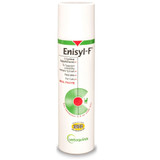-
Description
Description
Once your cat becomes infected with the feline herpesvirus type 1 (FHV-1), he will be infected for the course of his life. You can, however, give care, treat symptoms, and limit the length of the outbreak. Symptoms include runny eyes and nose, sneezing, fever, a loss of appetite, and perhaps ulcers in the mouth or on the tongue. Kittens and older cats are most susceptible. While there is no cure for the feline herpesvirus type 1 (FHV-1), it is good to know a product like Enisyl-F oral paste is available to minimize the effects. Enisyl-F for cats contains L-Lysine, an amino acid that helps subdue viral replication. It can reduce symptoms, shorten the time that your cat will have to suffer the symptoms, and reduce the frequency of the outbreaks. Enisyl-F is a safe, affordable and palatable paste for your kitten or adult cat. Enisyl-F with L-Lysine comes in a unique pump that makes it simpler to administer. When your cat shows the upper respiratory signs of a herpes virus outbreak, it is good to know there is an effective product to minimize the effects. Enisyl-F Oral Paste for Cats with L-Lysine is here to help.
- Highly palatable base
- Safe, easy-to-administer and affordable
- Suitable for kittens and adult cats
-
Useful Info
Useful Info
Useful Info
Administration: Adult cats: 1 to 2 mL twice a day Kittens: 1 mL twice a day, or as recommended by your veterinarian. Each pressure represents 1 mL of Enisyl-F paste. Enisyl-F is extremely tasty and is easily accepted by most cats. It can be applied directly in the mouth, on the nose or on the paw where it can be licked off. Alternatively, you may add the product to your cat's food, if more convenient. Cautions: Safe use in pregnant animals or animals intended for breeding has not been proven. If animal's condition worsens or does not improve, stop product administration and consult your veterinarian. Warnings: FOR ANIMAL USE ONLY. KEEP OUT OF THE REACH OF CHILDREN AND ANIMALS. IN CASE OF ACCIDENTAL OVERDOSE, CONTACT A HEALTH PROFESSIONAL IMMEDIATELY. STORE IN A COOL, DRY PLACE. -
Ingredients
Ingredients
Ingredients
Ingredients: Purified water, L-Lysine HCI, sorbitol, cod liver oil, xanthan gum, tuna flavor, soy lecithin, silica aerogel, caramel color, potassium sorbate, sodium benzoate.
Active Ingredients per 1 mL pump (1 gram): L-Lysine Hydrochloride 250 mg - Reviews
- Highly palatable base
- Safe, easy-to-administer and affordable
- Suitable for kittens and adult cats
Useful Info
Administration: Adult cats: 1 to 2 mL twice a day Kittens: 1 mL twice a day, or as recommended by your veterinarian. Each pressure represents 1 mL of Enisyl-F paste. Enisyl-F is extremely tasty and is easily accepted by most cats. It can be applied directly in the mouth, on the nose or on the paw where it can be licked off. Alternatively, you may add the product to your cat's food, if more convenient. Cautions: Safe use in pregnant animals or animals intended for breeding has not been proven. If animal's condition worsens or does not improve, stop product administration and consult your veterinarian. Warnings: FOR ANIMAL USE ONLY. KEEP OUT OF THE REACH OF CHILDREN AND ANIMALS. IN CASE OF ACCIDENTAL OVERDOSE, CONTACT A HEALTH PROFESSIONAL IMMEDIATELY. STORE IN A COOL, DRY PLACE.Ingredients
Ingredients: Purified water, L-Lysine HCI, sorbitol, cod liver oil, xanthan gum, tuna flavor, soy lecithin, silica aerogel, caramel color, potassium sorbate, sodium benzoate.| Active Ingredients per 1 mL pump (1 gram): | |
|---|---|
| L-Lysine Hydrochloride | 250 mg |
Reviews
-
Great Lysine Treats for our Cat
The treats were shipped quickly and carefully. They really seem to help our cat. Thanks for everything.
-
My cat wont eat without it
As a kitten my cat was diagnosed with a viral eye infection and I was told to feed her this to boost her immunity. She has been eating it ever since, about 5 years now, two times a day, and has never had another eye infection.
-
Excellent product!
After having to take one of my cats to the emergency clinic from a feline herpes outbreak, they gave me this product to use with the instructions of giving it to him daily. that was two years ago. I found it at Healthy Pets for a reasonable price and have been giving it to him faithfully on a daily basis. He loves it and actually carries on every night when it's time. It's like a treat! When the water eyes start I know I have to increase the amount and it has kept it suppressed. I find that symptoms flare up seasonally so I increase what I give him for a few days and the symptoms go away. I highly recommend this product if you have cats with the herpes virus and have had difficulty keeping it in check.
-
This is a wonderful product that I couldn't do without here in my sanctuary.
Thank you, Healthy Pets, for your wonderful products and fast response. I will be a continuing customer.
-
Finally!
Two of my kitties have a chronic URI but they refuse to take Lysine in any form...until now. My vet recommended that I try these treats and I\'m so glad she did. I finally found something that my kitties LOVE and actually get excited when they see the bag come out of the cupboard. I will be a regular customer, without a doubt. Hope they work as well for you as they have my crew!
-
When will it get better
I recently adopted my first kitten after years of believing I hated cats. (to my surprise, when my adult son came home a 1yr old black cat I fell in love) anyway so I broke down and found the love of my life littly 4 month old black kitty but from day one he has some issues and then this sneezing started the first time a round of poliymycin he got better, this time however the sneezing was getting horrible and the vet gave him a long acting shot and the Viralys gel. He takes it great but the sneezes have gotten worse and the stuff he is flinging is very annoying. How long before it gets better? I think about upping the doseage he is now 6months and weighs 6.5 lbs. He is only getting it once a day so I noticed where it calls for twice a day. I love this little fellow and he was sneezing in my face. is this contagious to other cats? Humans? Any help would be good.
-
My cats love them
I have been using the pump form of this product. I decided to give the treats a try. I have 5 cats and they all liked the treats. I have one cat that doesn't like any treats and she was purring asking for more.
-
Great product
My friend suggested this product for my cat colony, & it is great at keeping the feline virus to a minimum when rescuing multiple cats from different areas & they become part of your family cat pack, rate A+ will continue to purchase as long as its available & have multiple cats to treat, thank you
-
Excellent for his eyes
Prompt and excellent!!
-
Cat loves treats
My cat loves these treats and begs for more even though he is a picky eater...excellent product



![VetriScience Lysine Complete for Cats (2.75 oz) - [Immune Health] VetriScience Lysine Complete for Cats (2.75 oz) - [Immune Health]](https://cdn11.bigcommerce.com/s-ransurezbm/images/stencil/570x633/products/2659/20213/V090077M060__72895.1771042463.jpg?c=1)
![VetriScience Lysine Complete for Cats (2.75 oz) - [Immune Health] VetriScience Lysine Complete for Cats (2.75 oz) - [Immune Health]](https://cdn11.bigcommerce.com/s-ransurezbm/images/stencil/160w/products/2659/20189/V090077M060-1__30684.1729882055.jpg?c=1)







